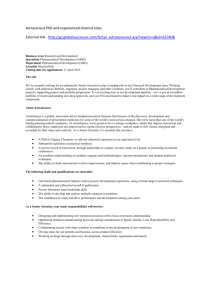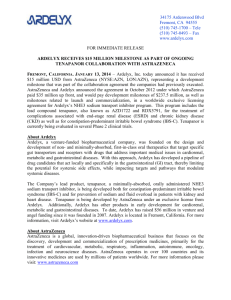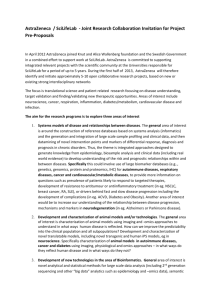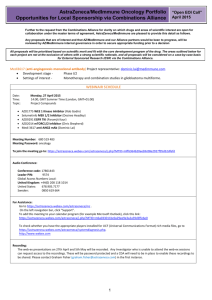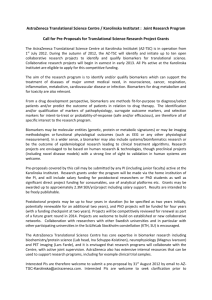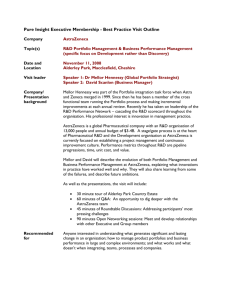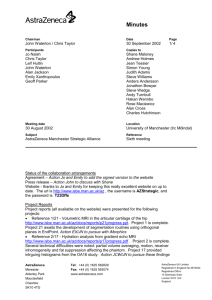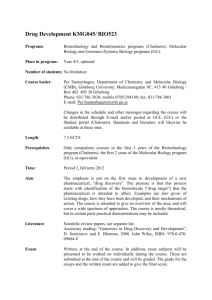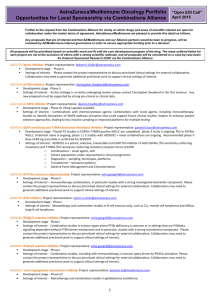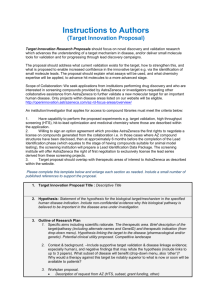Global Standard Expectations of Third Parties PDF 174KB
advertisement
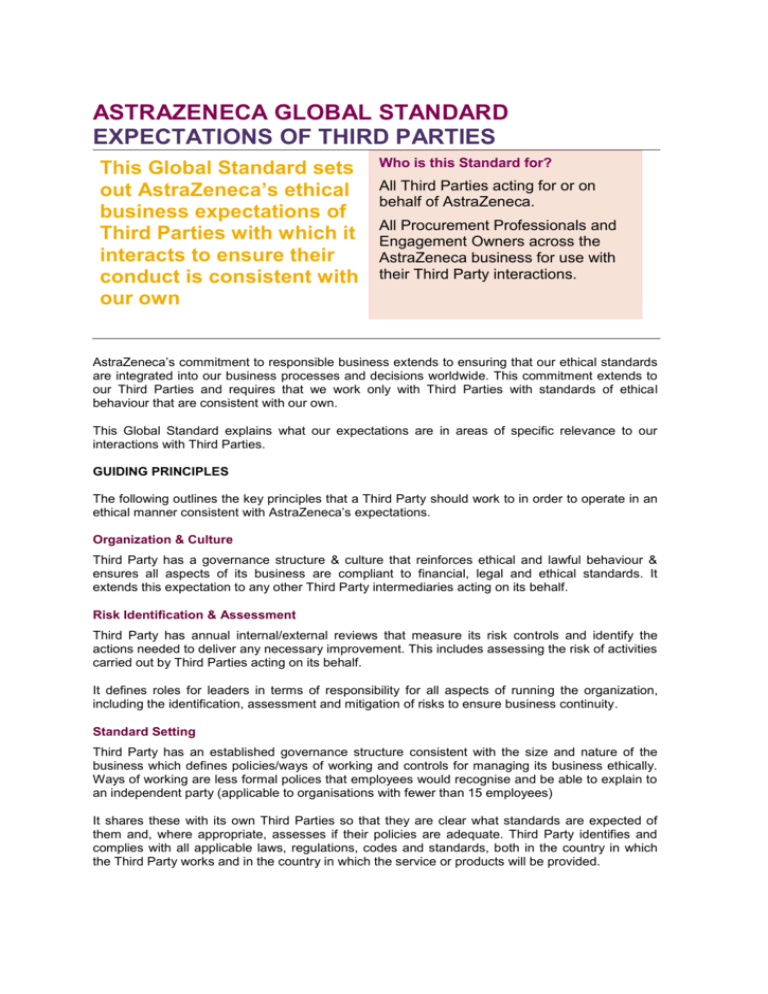
ASTRAZENECA GLOBAL STANDARD EXPECTATIONS OF THIRD PARTIES This Global Standard sets out AstraZeneca’s ethical business expectations of Third Parties with which it interacts to ensure their conduct is consistent with our own Who is this Standard for? All Third Parties acting for or on behalf of AstraZeneca. All Procurement Professionals and Engagement Owners across the AstraZeneca business for use with their Third Party interactions. AstraZeneca’s commitment to responsible business extends to ensuring that our ethical standards are integrated into our business processes and decisions worldwide. This commitment extends to our Third Parties and requires that we work only with Third Parties with standards of ethical behaviour that are consistent with our own. This Global Standard explains what our expectations are in areas of specific relevance to our interactions with Third Parties. GUIDING PRINCIPLES The following outlines the key principles that a Third Party should work to in order to operate in an ethical manner consistent with AstraZeneca’s expectations. Organization & Culture Third Party has a governance structure & culture that reinforces ethical and lawful behaviour & ensures all aspects of its business are compliant to financial, legal and ethical standards. It extends this expectation to any other Third Party intermediaries acting on its behalf. Risk Identification & Assessment Third Party has annual internal/external reviews that measure its risk controls and identify the actions needed to deliver any necessary improvement. This includes assessing the risk of activities carried out by Third Parties acting on its behalf. It defines roles for leaders in terms of responsibility for all aspects of running the organization, including the identification, assessment and mitigation of risks to ensure business continuity. Standard Setting Third Party has an established governance structure consistent with the size and nature of the business which defines policies/ways of working and controls for managing its business ethically. Ways of working are less formal polices that employees would recognise and be able to explain to an independent party (applicable to organisations with fewer than 15 employees) It shares these with its own Third Parties so that they are clear what standards are expected of them and, where appropriate, assesses if their policies are adequate. Third Party identifies and complies with all applicable laws, regulations, codes and standards, both in the country in which the Third Party works and in the country in which the service or products will be provided. Third Party complies with all relevant contractual customer requirements, even where these are higher than local or national laws. Training and Competency Third Party has a training program that achieves an appropriate level of knowledge, skills and abilities in management and workers to address the expectations in this Standard. Control Activities Third Party has monitoring in place, to ensure that processes are being adequately followed and risk control measures are effective. Identified process and control failures should be addressed. Reporting, Investigation and Remediation Third Party encourages its employees to report concerns or illegal activities in the workplace without threat of reprisal, intimidation or harassment. Third Party investigates such reports and other incidents and takes corrective action if needed. WHAT THIS MEANS IN PRACTICE Third Party is free to determine what methods it uses to meet the expectations in this Standard. It is acknowledged that local laws, values and cultural expectations may influence how these principles are applied in practice but they must be in the spirit of this Standard. For certain highly sensitive areas, the Third Party may be expected to work exactly to AZ policies and standards but this will be specified in the contract. In most cases, prior to contracting with a Third Party, AstraZeneca assesses how well the above principles are being applied to both the governance of the Third Party and the relevant risk areas outlined in this Standard. This is delivered through our Third Party Risk Management framework. On-going Third Party relationships are subject to periodic re-assessment to ensure standards have been maintained including responding to any changes in the conduct, reputation or risks related to the particular Third Party. For more information on the framework, please refer to the AstraZeneca external website http://www.astrazeneca.com/Responsibility/Working-with-suppliers. AstraZeneca expects the same standards of its own employees and actively encourages Third Parties to report any incidents they believe contravene any of the principles outlined in this Standard. Details on how to raise a concern can be found at azethics.com. 1. ANTI-BRIBERY AND ANTI-CORRUPTION Third Party has a zero tolerance for bribery or corruption and does not give or receive bribes when conducting business. Third Parties shall not: • Offer, give, request or accept bribes or permit sub-contractors or others to do so on their behalf. This includes: o Offering or giving – directly or indirectly – money or anything else of value, including gifts and hospitality, to any person or organisation that is intended to, or could be seen as an attempt to influence or reward them to behave improperly in order to obtain or retain business or secure a business advantage for themselves, their organisation or AstraZeneca, or as an attempt to influence or reward an official action or decision (e.g., by a public official) o Requesting or accepting – directly or indirectly – money or anything else of value, including gifts and hospitality, if it is intended to, or could be seen as an attempt to compromise their independence or judgement, or to improperly influence a business decision for themselves, their organisation or AstraZeneca When specifically authorised by AstraZeneca, Third Parties may: • Provide services to AstraZeneca or on AstraZeneca’s behalf • Provide appropriate hospitality or items of value e.g. medical textbooks. However, under no circumstances, may Third Parties give gifts of a personal nature (e.g. gift cards, restaurant vouchers) on AstraZeneca’s behalf • Give contributions on AstraZeneca’s behalf • Participate in political activities (e.g. lobbying). However, under no circumstances may Third Parties give any political support (e.g. finance or resource political campaigns on behalf of AstraZeneca) Third Parties interacting with Public Officials on behalf of AstraZeneca shall: • Comply with the specific requirements of contracts and agreements with AstraZeneca, such as not making any facilitation payments, either directly or indirectly, to public officials (including healthcare professionals and other individuals employed by public sector organisations), regardless of whether such payments are nominal in amount, unless under duress (i.e. where there is reasonable fear for personal safety) • Promptly report in writing to the AstraZeneca Engagement Owner all incidents where they are involved in the following situations: a) b) 2. Facilitation Payments are requested but not paid; or Payments are demanded under duress, whether paid or not CONFLICTS OF INTEREST Third Party does not allow Conflicts of Interest to influence or compromise the professional duties and decisions of the Third Party or its employees. Third Parties shall: • Inform the AstraZeneca Engagement Owner in writing of any actual, apparent or potential conflicts of interest relevant to the Third Party’s performance of services for AstraZeneca, at the time they become known • Have financial controls in place to prevent conflicts of interest affecting procurement and financial decision making 3. EMPLOYMENT PRINCIPLES Third Party operates in line with internationally recognised human rights, and promotes and maintains a culture of respect and equal opportunities. NON-DISCRIMINATION AND FAIR TREATMENT • Third Parties shall provide a workplace free of harassment and discrimination. Discrimination for reasons such as race, colour, age, gender, sexual orientation, ethnicity, disability, religion, political affiliation, union membership or marital status is not condoned • Decisions about recruitment, development and promotion are based purely on merit, performance and ability CHILD LABOUR Third Parties shall: • Not use child labour. The minimum age for employment is 15 years of age (or 14 in accordance with developing country exceptions under International Labour Organisation (ILO) Convention no.138). If local minimum age law stipulates a higher age for work or mandatory schooling, the higher age applies • Not employ workers under 18 at night or in hazardous conditions FREELY CHOSEN EMPLOYMENT • Third Parties shall not use forced, bonded or indentured labour or involuntary prison labour WAGES, BENEFITS & WORKING HOURS Third Parties shall: • Pay employees according to applicable wage laws, including minimum wages, overtime hours and mandated benefits • Have working hours that comply with national laws • Communicate with the employee the basis on which they are being compensated in a timely manner • Communicate with the employee whether overtime is required and the wages to be paid for such overtime FREEDOM OF ASSOCIATION • Third Parties shall respect the rights of employees, as defined in local laws, to associate freely, join or not join labour unions, seek representation and join employees’ councils 4. SAFETY HEALTH AND THE ENVIRONMENT Third Party carries out business in an environmentally responsible manner and promotes a safe and healthy workplace for all their employees, including those who work on their behalf worldwide. PROTECTION OF THE HEALTH AND SAFETY OF PEOPLE Third Parties shall: • Protect people from unhealthy exposure to physical, psychological, chemical and biological hazards. Significant releases of chemicals are prevented or otherwise mitigated through reliable process safety controls • Make information relating to SHE risks, chemicals and other hazardous materials, including pharmaceutical materials available and use it to manage risks and train and protect people • Put registrations/notification approvals and applicable legal documentation for the manufacture, import and transport of hazardous materials in place as required by local and international regulations ENVIRONMENTAL PROTECTION & CONSERVATION Third Parties shall: • Manage business activities in a way that, as far as practical, avoids the use of hazardous materials, conserves water, energy and other natural resources and minimizes the generation of waste through avoidance, reuse and/or recycling • Ensure any emissions to air, water and land are in compliance with laws and regulations and controlled or treated to the extent necessary to eliminate, or otherwise minimize the risk of, adverse affects on human health or the environment 5. TRADE CONTROLS AND COMPETITION Third Party complies with all competition and anti-trust laws applicable in the countries where it operates. It is committed to importing, exporting and engaging in all other forms of trade in a legal and ethical manner. TRADE CONTROLS • Third Parties shall comply with applicable trade regulations including licensing requirements, boycotts, embargoes and other trade restrictions that have been approved by recognised national and international authorities COMPETITION Third Parties shall: • Only seek competitive advantage through lawful means and conduct their business consistent with fair and vigorous competition • Only engage in dialogue with competitors when there is a legitimate business reason to do so, and the dialogue is such that it will not restrict competition (e.g. is limited to public or non-commercial information) • Not abuse their position, if it is dominant or has a monopoly, to exclude competitors or exploit customers 6 DATA PRIVACY Third Party collects, uses, retains and discloses AstraZeneca personal data in a fair, transparent and secure way. Third Parties shall: • Only use AstraZeneca Personal Data under our instructions and not use it for their own purposes • Ensure that effective organisational and security measures (both technological and physical) are applied to all AstraZeneca Personal Data to ensure the privacy of affected individuals • Appoint a representative who is accountable for data privacy and security in their company • Ensure information is protected and kept secure at all times from unauthorised use, damage, disclosure, diversion or removal, whether through accident, improper act or breach of trust • Ensure employees who will have access to AZ Personal Data are appropriately trained in their responsibilities around processing and protecting the Personal Data 7. RESEARCH & DEVELOPMENT ETHICS Third Party conducts high quality science delivered to high ethical standards in all areas of research and development. Specifically in the areas of: • • • Supply or use of biological samples especially human embryonic stem cells (hESCs), and genetically modified organisms (GMOs) Animal research & supply Clinical trials and patient safety Third Parties shall • Provide assurance that they comply with all national or state laws, regulations & recognised international quality and safety standards applicable to the proposed work including bio-safety containment in all countries in which they operate • Ensure that the appropriate informed consent & personal data protection procedures are in place and applied consistently ANIMAL RESEARCH AND WELFARE Third Parties shall apply the following principles to all animal studies and to the breeding and supplying of animals for use in such studies: • A humane approach must be adopted in the care and treatment of all animals, and the greatest consideration given to their health and welfare, consistent with meeting the necessary scientific objectives • All animal studies must be carefully considered and justified to ensure that the principles of the 3Rs (replacement, reduction, refinement) are applied • Animal studies should not involve wild-caught non-human primates or great ape species 8. PRODUCT SECURITY Third Party tackles the threat of counterfeit and illegally traded medicines and improving the security of the end-to-end supply chain. Third Parties shall: • Not be involved in any activity related to counterfeit or illegally traded medicines. Counterfeit medicines are those that are deliberately and fraudulently mislabelled with respect to identity and/or source. Illegally traded medicines include illegally diverted, fraudulently traded, tampered with and/or stolen medicines • Inform AstraZeneca in a timely manner in the event of any incident related to illegally traded or counterfeit medicines and assist AstraZeneca in any subsequent investigation • Provide a secure environment for all activities relating to AstraZeneca medicines and take the necessary steps to ensure the authenticity of medicines through the end to end supply chain. This includes: o 9. Procedures and records to ensure traceability of finished products as well as any waste, surplus, returned or discarded products, including packaging PRODUCT COMMUNICATIONS Third Party provides information about our medicines and other products consistent with AstraZeneca’s high ethical standards. Third Parties shall: • Only provide information about AstraZeneca products when authorised to do so. This includes communications about our products in person or through written material, and delivered through any medium, including the Internet • Promote AstraZeneca products in an ethical, fair and balanced way • Use only promotional materials and other product information that have been approved through appropriate AstraZeneca review procedures • Not engage in direct to consumer/direct to patient communications unless permitted by local laws and authorised by AstraZeneca 10. CONFIDENTIALITY AND INSIDER TRADING Third Party protects confidential information from improper disclosure. Third Parties shall: • Agree to confidentiality agreements if confidential information is to be shared & ensure any authorised communication of confidential information is limited to individuals who have a “need to know” • Prohibit their employees from insider trading for their own or other’s personal profit These requirements apply even to misuse use of Confidential information after a Third Party has finished doing business with AstraZeneca. GLOSSARY AND DEFINITIONS AstraZeneca - for the purposes of this document the term AstraZeneca refers to AstraZeneca, MedImmune and all other companies within AstraZeneca group, unless the AstraZeneca Senior Executive Team makes an exception. Code of Conduct – this is AstraZeneca’s guide to understanding how AstraZeneca’s high level values are to be translated into consistent actions worldwide. It provides guidance about what is expected of each AstraZeneca employee. Confidential information – information that gives AstraZeneca and the Third Party a competitive edge. This includes, but is not limited to-intellectual property and know-how; managerial information and statements of strategic intent; pricing or stock-market sensitive data and statements. Engagement Owner – Employees responsible for engaging and managing services provided by a Third Party ILO – International Labour Organization. An international organization responsible for drawing up and overseeing international labour standards. It is the only 'tripartite' United Nations agency that brings together representatives of governments, employers and workers to jointly shape policies and programmes promoting Decent Work for all. Personal Data - any information about an identified or identifiable natural person. Product information - any information, material or activity, promotional or non-promotional, designed to inform healthcare professionals and organisations, patients, investors, the media and others about the characteristics and use of our products. Incidents - include theft of material, discovery of counterfeit or fraudulent activity, demonstration by activists, threat to staff, SHE, bribery and corruption or any other area covered by this document. Third Party - any person, company or organisation, other than an AstraZeneca legal entity or an AstraZeneca employee, with which AstraZeneca engages to satisfy a genuine and legitimate business need. Version 1.0, June 2014
